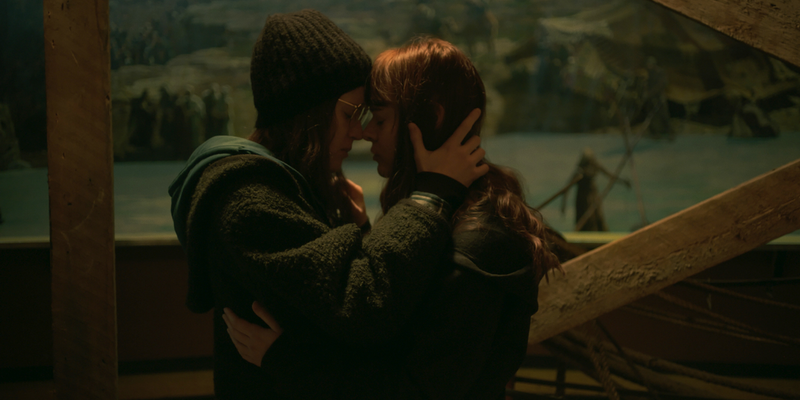
Two lesbian teenagers attempt to keep their relationship secret from
their Jehovah's Witness community.
Review by
Eric Hillis
Directed by: Mark Slutsky, Sarah Watts
Starring: Anwen O'Driscoll, June Laporte, Liane Balaban, Deragh Campbell, Tim
Campbell, Antoine Yared, Hasani Freeman

It's become a cliché to set your lesbian drama in the past, with movies
like
Ammonite,
Carol,
The Handmaiden
and
Portrait of a Lady on Fire
all playing out their tales of taboo love against period backdrops.
Setting such stories in the far past adds an immediate extra dash of
drama, as two women hooking up in Victorian England or 18th century
France is obviously a bigger deal than in the western world of the 21st
century.
Writer/directors Mark Slutsky and Sarah Watts have set
their lesbian drama, You Can Live Forever, in the past, but in the near past of the early 1990s. You might
wonder why this setting is necessary, as the movie is set in a Jehovah's
Witness community, where attitudes to homosexuality haven’t exactly
evolved in the past three decades. You might also question why this
particular community was chosen, as lesbianism was still largely a taboo
in mainstream society at the time the film is set.

With regards to its period setting,
You Can Live Forever doesn't so much make you think about
what life must have been like for its lesbian protagonists in the early
'90s, but rather how they might have spent the years since. When the
movie ends you find yourself thinking about all the people who have
wasted decades living their lives on somebody else's terms simply
because they had the misfortune to have been born at the wrong time. Gay
people of older generations must feel particularly cheated as they watch
today's teenagers openly live the lives they had to shun at worst or
live in secret in best.
Living their lives in secret are You Can Live Forever's young heroines Jaime (Anwen O'Driscoll) and Marike (June Laporte). The two teenagers have very little in common. Jaime is an agnostic
from English speaking Canada who goes to stay with her aunt Beth (Liane Balaban) and uncle Jean-Francois (Antoine Yared) in French speaking
Quebec while her mother struggles with the recent death of Jaime's
father. Beth and Jean-Francois are happy to take in their niece, but
while under their roof she must play by their rules. That includes
attending meetings of their Jehovah's Witness church, which sees Jaime
reluctantly don a frumpy dress.
Things look up for Jaime however when she spots the pretty Marike at
the meeting. The two strike up a conversation afterwards and quickly
become fast friends, with Jaime spending most nights at Marike's family
home. What begins as platonic bed-sharing soon evolves into physical
lust as the two girls indulge their mutual attraction whenever away from
the disapproving eyes of those around them.

As for why the movie plays out in a Jehovah's Witness community, well
it's because co-director Watts was herself raised in such a setting.
This may be key to why the film is so even-handed when it comes to the
religion. This isn't a simple "gays good, religion bad" narrative,
rather it's a very pragmatic and relatable tale of how compromise is key
in relationships. Jaime's cynicism towards religion is countered by
Marike's commitment to her faith. Marike understands her church doesn't
approve of her sexuality, but she doesn't believe that she has to choose
between the two. She handles her lesbianism the way people handle soft
drugs, believing she's doing nothing wrong but knowing she has to keep
it a secret regardless. When Jaime mocks Marike's beliefs, even those of
us who share Jaime's views on religion (which, let's face it, is
probably the core audience for a movie like this) can feel the dagger
being plunged into Marike's heart.
Queer themed movies often feel like the filmmaker wants to change how
conservatives view homosexuality.
You Can Live Forever might be the first movie of its kind
I've seen that seems to be trying to make liberals reassess how they
view people of a religious background. It's a refreshingly open-minded
approach in these increasingly binary "you're either with us or against
us" times. The film continually confounds our expectations of this sort
of drama, with characters we expect to play villainous roles instead
showing compassion, even when doing so contradicts their beliefs. We're
told Marike's mother left her family because of a clash with their
religion. Marike's older sister Amanda (Deragh Campbell) seems
aware of what's really going on between her sister and her new friend,
but she keeps it to herself as though worried she may lose another
family member if the truth comes out.
Some have criticised the film's bland visuals, but they help us focus
on the people in the frame rather than the world around them. There are
some clever, economical camera setups employed by Slutsky and Watts,
with an impressively staged scene in which the lovers are framed in the
back of a car while their prospective male dates are in the front
seats.

O'Driscoll and Laporte are future stars in the making, and the romance
between their characters is truly palpable. Whether you're straight or
queer, you'll find yourself relating to that awkwardness you feel as a
lovestruck teenager, how a simple walk home from school with the object
of your affection can make you feel like you're on drugs.
I expected You Can Live Forever to be an angry film, one
that would leave me feeling furious against religion and its
narrow-mindedness. I didn't expect it to be such a warm and romantic
tale whose primary agenda is to inspire tolerance from both sides of its
central debate.

You Can Live Forever is in
UK/ROI cinemas from June 16th.
